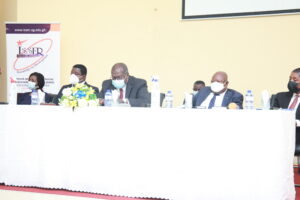…else it will fail like the others
To ensure that the new Development Bank Ghana (DBG) achieves the purpose for which it was established – i.e. to support the private sector to propel economic growth – it is very essential that the bank’s independence be protected else it will fail like the others, financial experts have said.
In a panel public dialogue organised by the Institute of Statistical, Social and Economic Research (ISSER) at the University of Ghana, themed ‘National Development Bank and Sustainable Financing in Ghana’, economists and other financial experts who took part in a panel discussion strongly urged government to strengthen internal structures of the bank in order to avert it from from suffering similar ill-fate to previous development banks which couldn’t live up to their mandates due to lack of independence.
Speaking at the event, Director of ISSER Prof. Peter Quartey said lessons must be learned from successful development banks in other countries which have strong structures that enable them to appoint those qualified to lead the bank.
“There is no doubt that we need long-term financing. What we are providing is short-term, but certain investments require long-term financing. Unfortunately, we have given our banks universal licences and so all of them go into retail and other more profitable ventures than lending to the sectors which will transform the economy – and that’s why we need a national development bank.

“National development banks have been successful in other countries. However, their success is dependent on whether they are run like a business, or if they are just operated like any state-owned entity wherein we appoint cronies to boards or management, or government appointees who are less qualified to manage the bank and so on and so forth.
“What we need is an independent national development bank that is able to advertise and recruit competent staff; that is able to appoint boards of different backgrounds with the highest level of competencies and operate like a business. If we are able to do this, we are certainly going to be successful; and it will help transform our economy, create jobs and improve livelihoods,” he said.
Managing Director of the Agriculture Development Bank (ADB), Dr. John Kofi Mensah, also emphasised the need to select staff, board and management of the bank who are most qualified for the job and not to do things business as usual.
“One of the key things we should look at is human resource of the development bank. We should look at a blend of foreign and local. In terms of the local, we take people who are very experienced in the financial sector and also try and get people who are committed and can be trusted to do what will influence economic growth. Once we do that, we should be heading somewhere,” he said.
Using his own outfit, ADB, as an example of development banks which have not really seen independence in terms of appointing leadership, he urged government to change its approach with the new DBG.
“In the case of ADB, you can see that there have been changes of CEOs upon CEOs – not based on the right mentality for a development bank, but based on who is in power. The issue is that we have to look at performance and make sure there is sustenance in terms of the human resource and corporate governance, at least for some period, so that whatever we are experiencing or whatever we are going to introduce will not be cut down by political changes,” he said.
Commenting on the same subject, Senior Lecturer-Department of Finance, Dr. Vera Fiador, also pushed for proper structures which will automatically appoint qualified people to manage the bank based stipulated requirements, rather than leave it in the hands of politicians.
“If we don’t put in place the proper structures as to who sits on the board, who has the authority to make certain decisions, then we are not likely to achieve the success that we so desire. So, of course, some of the things that will be necessary are: who has the qualification; what qualifications are we looking for; years of experience; level of education and other technical skills etc.
“These are things we need to factor-in so that it’s not just anybody who gets to sit on the board. The independence of the board also needs to be looked at, because once we allow politics and other interests groups to take charge of where we are going, then it’s not going to augur well for us as a nation,” she said.










